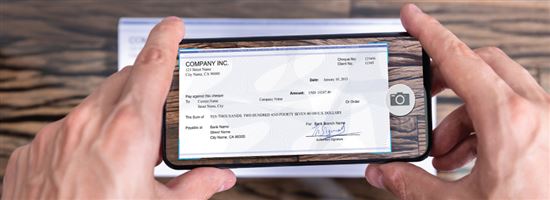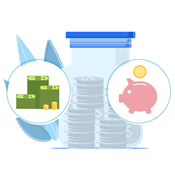4 Types of Checking Accounts
Ad Disclosure: This article contains references to products from our partners. We may receive compensation if you apply or shop through links in our content. This compensation may impact how and where products appear on this site. You help support CreditDonkey by using our links.
The right checking account can help you manage your money better. But there are many options. Find out which checking account is best for you.
 |
Checking accounts are necessary for your everyday banking activities, like paying bills and receiving direct deposit payments.
There are many different types of checking accounts. Most people stick with their checking account for years (or even decades), so it's important to pick one that fits your needs and will grow with you.
1. Basic Checking Account
A basic checking account is simply an account that lets you do everyday banking activities. You can do things like:
- Deposit and withdraw money
- Make purchases with a debit card
- Withdraw money from ATMs
- Get direct deposits of paychecks
- Pay bills online
- Write checks
- Transfer funds between bank accounts
Basic checking accounts usually don't pay interest. So make sure you also have a savings account that pays interest to help your money grow. You should only keep enough in your checking account for day-to-day needs.
Just about all banks will offer a basic checking account. Usually, traditional banks (like Bank of America or Chase) will charge a monthly service fee. You can waive the fee by keeping a certain balance in the checking account or having a certain amount in direct deposits each month.
Having a monthly fee doesn't mean it's bad if it has features you need and you can meet the requirements. There are also lots of free checking options as well. Read on.
Checking accounts are meant for your everyday transactions, so you get unlimited access to your funds. Savings accounts are meant for saving money, so they have withdrawal restrictions. You're limited to just 6 transactions per month.
2. Free Checking
A free checking account typically means that there is:
- No opening deposit (or very low)
- No minimum balance requirement
- No monthly maintenance fee
These types of accounts are a good choice if you don't want to worry about keeping a certain balance.
However, free checking doesn't mean that it's completely fee-free. There may still be fees for things like wire transfers, out-of-network ATM fees, and paper statements.
Typically, free checking accounts can be found with online banks, small regional banks, or credit unions. It's rare to find a free checking account with a traditional, big-name bank.
BMO Smart Advantage Checking account - Earn $400 Cash Bonus*
$400 cash bonus* when you have a cumulative total of $4,000 in qualifying direct deposits within 90 days of account opening between 9/9/25 - 1/28/26. *Conditions apply. Accounts are subject to approval and provided in the U.S. by BMO Bank N.A. Member FDIC
3. Online Checking
Online-only banks are on the rise. They don't have physical locations, so they have less overhead. They'll often pass on these savings to customers in the form of reduced fees and/or higher interest rates.
Most online checking accounts have no monthly service fees or balance requirements. A lot eliminate other banking fees too, like overdraft fees or wire transfer fees.
ATM withdrawals are also not a problem. Online banks usually partner with nationwide ATM services. For example, Ally Bank gives you free access to over 55,000 Allpoint ATMs across the U.S. Plus, many also offer ATM fee reimbursements.
But there are some downsides to consider. Depositing cash is more of a hassle, so it may not be ideal for someone who gets paid in cash. A lot of online banks also have limited products, such as no mortgage loans.
Interest Checking
- 0.10% APY for daily balances less than $15,000
- 0.25% APY for daily balance over $15,000
- $10/month rebate for ATMs outside of Ally Network
- $0 minimum opening deposit
- No fees to open or maintain account
- FDIC insured
- Daily compounding interest
4. Interest Checking
Interest bearing accounts allow you to earn interest on your checking balance. Some banks may have a different name for it, such as "Rewards Checking" or "Premium Checking."
Online checking accounts will typically pay higher interest rates than traditional banking institutions. The interest rate may not be a lot, but at least you get a little bit of return on your money.
Some banks will reward a higher APY for higher account balances. But you may be required to maintain a certain balance. Or you may need to fulfill certain banking activities each month. This may not make much sense if you can just keep your money in a high-yield savings account.
Rewards Checking - Up to 3.30% APY
- Build your own APY with up to 3.30% APY*
- Zero monthly maintenance fees
- Zero overdraft or NSF fees
- Zero minimum monthly balance reqs
- No initial deposit requirement
- Unlimited domestic ATM fee reimbursements
- Online debit card management
- Simple, 3-step process for direct deposit
Other Special Types of Checking Accounts
 |
Besides the 4 main types of checking accounts, there are lots of other special variations as well. Here are other checking account types you may see.
5. Second Chance Checking
If you have a poor credit score or made some banking mistakes in the past, you may not qualify for a standard checking account.
A second chance checking account overlooks your banking history. It gives you the opportunity to open a bank account and rebuild your credit.
However, they may lack some features. Some may not have check writing privileges. Or they may not allow overdrafts, which is a way to protect you. In addition, a lot of second chance accounts have a monthly service fee that cannot be waived. But if you use your account responsibly, most will let you upgrade to a regular checking account within a year.
6. Student Checking
Student checking accounts are offered to college students, usually age 17-24. You must be enrolled in a school or have proof of admission to open an account.
Banks know that students don't have regular income. So student checking accounts usually have no monthly service charge, no balance requirements, and fewer fees.
7. Kids/Teens Checking
Teens and younger children can get a head start on learning healthy money habits. A parent will have to be a joint account owner until the child turns 18. Parents will have shared access so they can monitor activities.
Usually, once the child turns 18, it can be converted to a regular checking account.
8. Business Checking
If you own a small business, it's best to keep your business expenses separate from your personal ones. There are lots of business checking account options for all business sizes - from small freelancers to enterprises.
You'll get features just for businesses, like a certain number of free transactions, cash deposits, and employee debit cards. Many also come with built-in tools, like QuickBooks or Square integration.
Lots of business checking accounts are even free, which is good for side hustlers and micro businesses.
9. Senior Checking
These special checking accounts are designed to offer more stress-free banking for seniors. They may include advantages like lower fees and free checks.
However, compare some other options like free online accounts to see if those offer better benefits.
10. Cash Management Account
These is a special type of account offered by brokerage firms. A lot of brokerages are now also offering checking accounts with debit cards.
They have all the features of traditional checking accounts, like online bill pay and mobile check deposits. Plus, they often come with special benefits like ATM fee reimbursements.
It's a good option if you want to keep your savings and investments under the same roof. Brokerages partner with program banks to provide FDIC insurance, so you can trust your money is safe.
What to Look for in a Checking Account
When deciding on the best checking account for you, consider these factors:
- Monthly service fee: Some banks may charge a fee if you don't maintain a minimum balance each month. Is the requirement reasonable for you? If you don't want to worry about this, look at free checking accounts.
- Accessibility: You want convenient access your money whenever you need it. Do you need a physical branch or are you okay with banking completely online? Does the bank provide easy access to ATMs near you?
- Features: Some accounts may offer special perks, like overdraft forgiveness or ATM fee reimbursements. On the other hand, some free accounts may lack certain features, such as no check writing. Look for a checking account with features that you frequently use.
Can You Have More Than One Checking Account?
You can have multiple checking accounts at different institutions. There's no limit to how many you can open. However, make sure you can properly manage each account and meet any minimum balance requirements to avoid any service fee charges.
With so many different types of checking accounts, you may want more than one for different reasons. For example, you may have a primary checking account with a big national bank to get access to physical branches. This is also helpful if you're planning on applying for a loan and want to benefit from a banking relationship.
In addition, if you travel often, it's a good idea to have a free online checking account that reimburses international ATM fees.
Bottom Line
Checking accounts are a necessary part of personal finances. The best checking account for you depends on your needs. Think about what features you need and make sure you understand the terms and requirements.
Also - don't just go by the name of the checking account. For example, college students aren't limited to just a student account. Maybe you'll find that a free online checking account offers better perks and more convenience. Compare checking accounts carefully to find the best one for you.
Write to Anna G at feedback@creditdonkey.com. Follow us on Twitter and Facebook for our latest posts.
Note: This website is made possible through financial relationships with some of the products and services mentioned on this site. We may receive compensation if you shop through links in our content. You do not have to use our links, but you help support CreditDonkey if you do.
|
|
|





